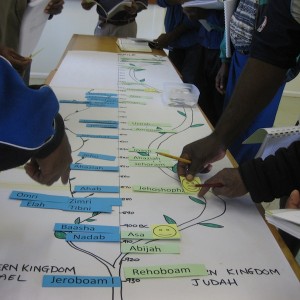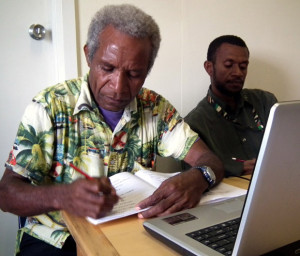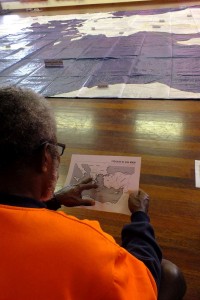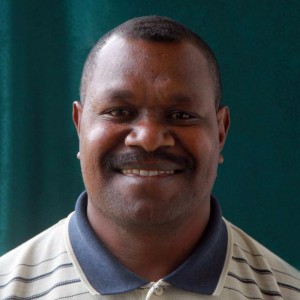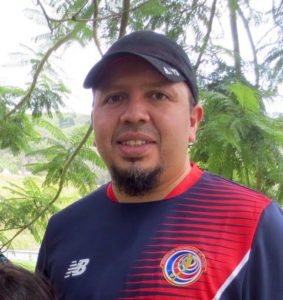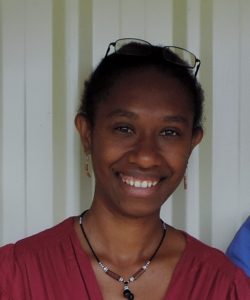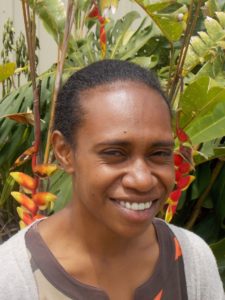Author Archives: lractrain
Audio Recording
What is it?
Come and learn the basic skills and knowledge to be able to produce clear, consistent, and natural sounding audio recordings that can be put on MegaVoice and Saber players, CDs, and narration for video Bible stories. We will be teaching the use of the Audacity Audio Editing Software. The morning will be spent in teaching. The afternoon will be time for practising the skills being taught.
Who should come?
Anyone who wants to learn recording skills.
Next session:
To be announced
Basic Computing: Linux
What is it?
A two-week workshop which introduces the participants to working with a computer. Participants will:
- learn about the basic hardware of a computer
- learn the basics of how to use a computer
- develop typing and mouse skills in order to be able to create text documents
Software that will be used, include: Linux (Wasta) and Libre Office (Writer)
Who should come?
Anyone who wants to learn how to use a computer and especially those who want to use a computer in their Bible Translation Project.
Prerequisites:
Required: Specific goal with using a computer, and access to a computer at home or at work
Next session:
11-24 March, 2020
29 July – 11 August, 2020
Basic Computing: Windows/MS
What is it?
A two-week workshop which introduces the participants to working with a computer. Participants will:
- learn about the basic hardware of a computer
- learn the basics of how to use a computer
- develop typing and mouse skills in order to be able to create text documents
Software that will be used, include: Windows 7 and Microsoft Word
Who should come?
Anyone who wants to learn how to use a computer and especially those who want to use a computer in their Bible Translation Project.
Prerequisites:
Required: Having a specific goal with using a computer; access to a computer at home or at work
Next session:
To be announced
Cultural Self-Discovery
What is it?
These workshops are based on “Biblical Multicultural Teams: Applying Biblical Truth to Cultural Differences” by Sheryl Silzer, which seeks to foster multicultural team-building by helping individuals recognise how their own cultural values form their Culture-based Judging System and replace Biblical truth. As a result, multicultural teams are not characterised by biblical values. The workshop takes participants through the process of cultural self-discovery from their childhood home to the present day in order to discover their own culture and apply biblical truth to cultural differences.
Who should come?
Anyone seeking to understand other cultures.
Next session:
To be announced
Building Your Vernacular Library
What is it?
This is a 5-day course to help people kick-start or rejuvenate their Vernacular literacy programme. It will equip people to encourage community ownership of the programme and includes how to plan and run writers’ workshops, test an orthography, write culturally relevant stories and produce materials all to encourage reading fluency.
Who should come?
SIL and BTA translation and literacy teams at any stage in their programme.
Next Session:
To be announced
Culture Meets Scripture
What is it?
Every people group has significant events–e.g. childbirth, puberty rites, weddings, death, planting/harvesting–culturally defined by carefully prescribed practices. Those practices reflect deeply held assumptions, values and one’s understanding of the world. They hold underlying meaning and thereby accomplish a given purpose and carry consequences if not followed. Powerful relational structures support them, ensuring that they are followed. But tensions arise in believers when those prescribed practices conflict with Scripture. This workshop introduces a process to equip bodies of believers to examine their practices in the light of Scripture and then to formulate a response that both aligns with Scripture and yet remains culturally meaningful. They will search the Scriptures for principles and/or specific instructions that apply to the underlying reasons for their traditional practices and the consequences of neglecting them. They will suggest cultural adjustments and then formulate an Action Plan to engage the body of believers in their home areas with steps toward transformation of their important events.
Who should come?
Believers who have some influence in the community e.g. pastors, elders, language program leaders, translators, SS and religious instruction teachers, Bible study leaders, etc. These should be from as many different religious affiliations as possible.
Pre-workshop assignment: interview different people in your village to learn what they do when there is death; why each practice must be done and what happens if they don’t do it. (Get further information from Ana Opungu, if needed).
If possible, at least two or three speakers of the language should come, up to 10 per language. This process accomplishes the most when different groups of believers are represented.
Next session:
To be announced
Learning that LASTS
What is it?
Learning that LASTS is a highly interactive seven-day workshop for people who want to improve the ability to help adults learn. It combines theory with opportunities to practise, then provides the immediate feedback needed to develop skills. The LASTS principles are trans-cultural, biblically based, and are supported by adult educational theory. Everything that is taught is modelled and practised. Since it began, approximately 600 people working in 10 countries have participated in Learning that LASTS workshops. They are now training people in a wide variety of subjects.
Who should come?
People involved in training adults.
Next session:
16-25 March, 2020
Participatory Methods for Engaging Communities
What is it?
The PMEC workshop equips Bible translators and other language development workers to facilitate discussions with groups of people within a language community so that they describe, analyze, decide and make plans for the development of their own language. The use of these methods helps to affirm the abilities of the language community, and increases their ownership of the work.
Who should come:
Translators, Literacy Workers, Language Development Workers
Date:
To be announced
Program Planning
What is it?
This two week workshop is to help language teams plan out their programs. Teams will determine what kind of impact they want to see for the whole community/ies they are working among to the details of what needs to happen to see that impact come about.
Who should come?
For all language workers (Papua New Guinean or expat) who do not have a long term plan on file with their supervisor, either through SIL or BTA; and who have been working in their program for at least one year. This workshop will be most helpful and fruitful if more than one team member is present.
Next session:
To be announced
Michel Pauw (Academic Dean)
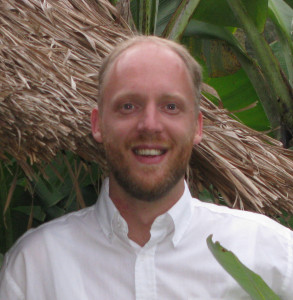 Michel Pauw is the Academic Dean of PILAT. He comes from The Netherlands and studied Theology, Classics, Education and Applied Linguistics. He has an MA in Classics and is specialized in Ancient and Koine Greek. He has an MA with honours in Education and a PGCert in Applied Linguistics. Michel has 15 years of experience in teaching teens and adults.
Michel Pauw is the Academic Dean of PILAT. He comes from The Netherlands and studied Theology, Classics, Education and Applied Linguistics. He has an MA in Classics and is specialized in Ancient and Koine Greek. He has an MA with honours in Education and a PGCert in Applied Linguistics. Michel has 15 years of experience in teaching teens and adults.
Since his arrival in Papua New Guinea in 2014, he is involved in teaching Biblical Hebrew, Biblical Greek and Linguistics.
Vernacular Creative Phonics
What is Creative Phonics all about? What do we do?
This is a 2 ½ week course introducing the Phonics method which is one part of a balanced Vernacular literacy programme. It aims to train the participants to start developing teaching materials based on the phonogram frequency count of the language and to teach reading and writing in the Vernacular through observation of lessons and teaching practice.
What is Involved?
- Why Creative Phonics
- 4 basic literacy principles
- How to order phonemes and phonograms
- Discover phonograms, not letters
- Frequency versus productivity
- How to motivate the learner
- Prepare and enhance stories for the Creative Phonics approach
- Let the children write!
- The first two weeks of teaching – a timetable
- Timetables, lesson plans and preparation
- What to teach when
- Monday: sounds
- Tuesday: spelling and words
- Wednesday: whole words
- Thursday: sentences
- Friday: whole story
- Materials, stories, books…
- Practice teaching
Who should come?
Anyone interested in having a vibrant Vernacular literacy program for children or adults especially Elementary and TPPS (Tok Ples Prep School) teachers.
Prerequisites Required:
The VCP course will be conducted in Tok Pisin and English, but reading assignments and handouts will use English.
- Applicants must be able to read, write and speak fluently in the vernacular in which they are teaching. Tok Pisin is considered a vernacular if you are teaching in a school that uses Tok Pisin as the mutual language of understanding in a Multilanguage setting.
- Teaching experience in TTPS, EP, E1 or E2.
- 10 pages of natural vernacular text. This text cannot be translated material.
- Must know some English and be able to read and respond to written questions in English.
Prerequisites Preferred:
- Vernacular dictionary. If you have both a lexical dictionary and a picture dictionary please bring both. Bring whatever dictionary you have.
- Able to read and write and understand English, in other words a higher proficiency in English.
Next session:
23 June – 10 July, 2020
Please find application on the Applications page.
Basic Exegesis
What is it?
A three-week course which introduces the student to the basic principles and practices in Biblical exegesis. Participants will be trained in three core components: observation, correlation and interpretation. A high priority is placed on practicing the concepts learned.
Who should come?
Bible translators, preachers and teachers of the Bible. The course will be taught in English, and at least one team member should have strong English skills.
Prerequisites:
Required: Good English proficiency
Preferred: Minimum of grade 8
Next session:
5-25 February, 2020
2-22 September, 2020
Old Testament Introduction
What is it?
A survey of the books of the Old Testament giving a summary of content and understanding each book in its historical, geographical and literary context. In addition to studying each book, background topics are taught including: Ancient Near East Geography, History and Religions; Geography of Israel; Religion in Israel; Introduction to the Canon; Introduction to Genre, Narrative, Poetry and Literary Structures; and Theology of the Old Testament.
A variety of methods are employed from a ‘lecture’ style approach, to group work and practical activities:
Here students are exploring the ‘family tree’ of the Kings of Israel and Judah during a lesson on the books of Kings.
Who should come?
The course is aimed at Papua New Guineans engaged in Old Testament translation or developing as translation consultants, but is open to anyone who would like to find out more about the Old Testament and its background.
Prerequisites:
Required: TTC-1; TTC-2; good English Proficiency
Preferred: Minimum of grade 10 or Bible School Training
Next session:
To be announced
Introduction to Biblical Hebrew
What is it?
A six-week course designed to introduce participants to Biblical Hebrew by using a variety of oral, aural and visual language learning strategies. Watch the video below to get an impression of what the course looks like.
After successful completion of the course, students:
- will have acquired a basic vocabulary of about 300 Hebrew words;
- will have acquired a reasonable fluency in reading Hebrew texts;
- will understand some basic concepts of Hebrew grammar;
- will have created a Hebrew-Tok Ples Dictionary;
- will have translated a full chapter of the Old Testament from Hebrew into Tok Ples
Who should come?
The course is aimed at Papua New Guineans involved in Old Testament translation or training to be consultants, but is open to anyone who wants to begin to learn the original language of the Old Testament.
Prerequisites:
Required: Either: TTC-1; TTC-2; Discover Your Language; in certain cases the Academic Dean may allow exceptions.
Preferred: Minimum of grade 10 or equivalent training.
Next session:
To be announced
Biblical Hebrew 2
What is it?
This 4-week course is a follow up on Hebrew-1, and focuses on the Hebrew verb system. We will be going through the book of Ruth in Hebrew. Participants will read through the whole book of Ruth in Hebrew, and work on a Hebrew / Tok Ples Dictionary. They will also be taught how to use their Hebrew skills in Bible Translation.
Who should come?
People who have completed Introduction to Biblical Hebrew and who want to further their knowledge and understanding of Biblical Hebrew.
Prerequisite:
Successful completion of Introduction to Biblical Hebrew.
Next session:
4-31 March, 2020
New Testament Introduction
What is it?
This course covers:
- the historical and socio-cultural background to Jesus’ life and ministry (focusing on the intertestamental times and Jewish life during the 2nd Temple period)
- a book by book survey of the New Testament, looking at the purpose, main ideas, date and authorship issues for each one.
- an introduction to modern approaches to the New Testament
- learning a visual ‘Walk through the New Testament’
Who should come?
The course is aimed at Papua New Guineans engaged in New Testament translation or developing as consultants, but is open to any who would like a better understanding of the New Testament and its background. The course will be in English so a reasonable standard of English is needed.
Next session:
To be announced
Introduction to New Testament Greek
What is it?
The course combines modern language-learning techniques with traditional approaches to teaching Greek, offering an accessible introduction within a Melanesian context. One of the features of the course is an emphasis on methods of learning a language, including listening, speaking, reading, writing and physical response to spoken instructions in Greek – helping the course participants to learn how to learn. By the end of the course the participants will be able to read with understanding simple narrative passages from the New Testament.
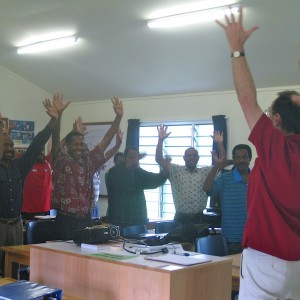
Who should come?
Any Papua New Guinean involved in New Testament translation and/or translation consulting. Also, any church leader who would like to begin to learn the original language of the New Testament.
Next session:
To be announced
New Testament Greek 2
What is it?
This four week course gives further training in New Testament Greek. Participants will review what they learnt in the Introduction to Greek course and move further in their understanding of Greek grammar and their ability to read Greek narrative.
Who should come?
People who have successfully completed Introduction to New Testament Greek and who want to further their knowledge and understanding.
Prerequisite:
Completion of Introduction to New Testament Greek
Next session:
To be announced
Translators’ Training Course (TTC)
What is it?
The Translators’ Training Course (TTC) is a 4-module course that provides training in translation principles, Bible background, study skills and language discovery. Participants attend as a team representing their language/tokples. Each team is assisted by a mentor.
- TTC-1 is an introductory course centred around producing a translation of Genesis 22:1-19.
- TTC-2 is based around translation of Genesis chapters 1-3 and Exodus ch. 15, looking at more Old Testament material and including an introduction to poetry and to the Hebrew language.
- TTC-3 is the first New Testament course, based on narrative and hortatory material (stories and sermons). An introduction to Greek is included. (not this year)
- TTC-4 is based around translation of Titus and teaches how to translate Epistle material. Greek skills are developed further to see how arguments are developed in the Greek text. (not this year)
It is expected that teams will complete the modules in order.
Who should come?
Teams of Papua New Guineans working on scripture translation. Each team needs to have at least two participants from the language community and a mentor who is able to be there in the course and provide on-going support between courses.
Prequisites:
Required: Applicants must pass an English Proficiency Test (available from Academic Training) before they can attend TTC-1; after each module a village assignment must be completed before applicants can attend the next module.
Preferred: Initial Skills Course for anyone with lower English proficiency.
Next session:
29 April – 3 June, 2020
TTC Pre-course English Enrichment
TTC Work Weeks
Lexicography
What is it?
This one-week workshop provides a brief introduction to the art of dictionary making, including organisation of data (subentries, homonyms, compounds, dealing with dialects etc.), various elicitation techniques, example sentences, figurative language, improving user-friendliness, the possibilities offered by the Rapid Word Collection workshop, as well as exporting and printing.
The emphasis in the workshop is on principles of dictionary making, irrespective of the software you are using, though we can offer help on the programmes currently in use: FLEx, WeSay, Toolbox and LexiquePro. The workshop is ideal for getting ideas and moving your dictionary project a step forward. Sessions will be mornings only, with time for individual work and private consultations in the afternoon.
Who should come?
Linguists and experienced Papua New Guinean translators, such as BTA consultants.
Next session:
To be announced
Orthotech
What is it?
This course is designed to help people learn to do Alphabet Design Workshops. The Alphabet Design Workshop is used to develop an alphabet quickly in about 2 weeks. The course will give background to the workshop, methods, phonetics, preparation and follow-up needed as well as other issues in alphabet design.
Who should come?
Any person interested in learning to do an Alphabet Design Workshop or help with alphabet design in another language. The course will be taught in English with some help in Pidgin if needed. Those with Grades 8, 10 and 12 proficiency are encouraged to attend.
Next session:
To be announced
Song Collection Workshop
What is it?
This workshop is designed to train others how to run a song collection workshop so that they can gather songs in their villages to create worship songbooks.
Who should come?
Anyone interested in running song collection workshops.
Next session:
To be announced
Paratext I
What is it?
A two-week introductory workshop that will introduce the participants in how to use the Paratext software for Bible translation. The course is designed for national translators with little or no experience with Paratext.
Who should come?
People involved in translation work but unfamiliar with the Paratext software.
Required knowledge:
Basic Computing Skills; reasonable English Proficiency. Participants bring their own computer.
Assumed knowledge:
The course will be taught mostly in English with some Tok Pisin.
Next session:
25 March – 7 April, 2020
12-25 August, 2020
Paratext II
 What is it?
What is it?
Further training in how to use the Paratext software for Bible translation. The course will start with intermediate features in Paratext and move into advanced features. The course will be taught using Paratext 7.5 (depending on software availability).
Who should come?
PNG translators who have successfully learned and practiced the concepts in Paratext 1 and are using Paratext to do Bible translation.
Prerequisites:
Paratext-1; intermediate knowledge of computers; [articipants bring their own computer and Paratext Project; good English Proficiency
Next session:
26 February – 10 March, 2020
25 November – 8 December, 2020
Song Writing Workshop
What is it?
This workshop is designed to help Papua New Guineans use tokples scriptures, poetry, or words to develop more music for Christian worship in their contexts.
Who should come?
Papua New Guineans who want to develop vernacular worship songs.
Next session:
To be announced
Strategies and Methods for Scripture Use
What is it?
This course discusses the importance of thinking strategically about the factors that affect the use of Scripture. It also suggests methods for encouraging people to use the Scripture in order to grow in their knowledge and application of Bible truths. There will be lectures, group discussions and practical exercises. Topics include:
- Language and the Plan of God;
- Barriers to Scripture Use;
- the Importance of Key Terms;
- methods for using Scripture with music, drama, storying, and arts.
Who should come?
People who are involved in the work of their church as leaders, elders, youth leaders, church-related teachers.
Assumed knowledge:
The course will be taught in English.
Next session:
To be announced
Vernacular Path to English
What is it?
This is a 2 ½ week course designed to train national Elementary teachers how to bridge to English from their foundation in Vernacular Literacy. It takes the participants through this process of bridging by focusing on teaching listening and speaking skills in English first. Then they have guided help from the staff in comparing the sounds of their Vernacular to English. On this basis they then start planning lessons for teaching the sounds and letters of English. The course includes lesson planning, materials production and teaching practice.
Who should come?
National Elementary teachers and trainers and SIL & BTA personnel who want to facilitate bridging from Vernacular into English in Elementary schools.
Prerequisites Required:
The VPE course will be conducted in English and requires knowledge of both English and the Vernacular in which you teach.
- The ability to read, write and speak in English and to follow directions given in English as well as be able to read and respond to written questions in English.
- The ability to speak, read and write, in the vernacular language in which you are teaching.
- Have experience as a TTPS, EP, E1 or E2 teacher.
Prerequisites Preferred:
- Currently posted to a local school where the vernacular is used in EP, E1, and E2.
- Basic conversational ability in English.
Next session:
18 August – 4 September, 2020
Please find application form on the Applications page.
Paratext III
What is it?
The Paratext III Course provides additional training in how to use the Paratext software for Bible translation. This course covers using Paratext for Key Terms, and how to use the Interlinearizer for Adapting and Glossing translation text.
Who should come?
National translators who have successfully learned the concepts in Paratext II and are using Paratext to do Bible translation.
Prerequisites:
- Completion of the Paratext II course (please contact us if you think you qualify but have not taken Paratext II).
- Translation data within Paratext.
Assumed knowledge:
Intermediate knowledge of computers. The course will be taught mostly in English with some Tok Pisin.
Next session:
To be announced
Advanced Paratext
Course Description:
Paratext is loaded with helpful tools, but what do they do, how should we use them, or when should we use them? How does each one fit in the translation process? This workshop answers those questions. Participants will learn when, how, and why to use various new and advanced Paratext tools to continually improve their translations and to more effectively check translations for other teams.
Who should come?
Consultants, translators, and advisors experienced in using Paratext
Prerequisites Required:
Good computing skills; High level of English proficiency; Participants bring their own computer.
Prerequisites Preferred:
Participants have their own Tok Ples Paratext project.
Next session:
To be announced
Discover Your Language
What is it?
A four-week course for Papua New Guinean Bible translators who want to begin to investigate the grammatical structure of their own language, in order to better understand the process of translation into their Tok Ples and to improve the linguistic naturalness of their translation.
It follows on from the Language Discovery modules in TTC-1/2. Participants will be introduced to various linguistic concepts and find out how they work in their own languages. By the end of the course, participants will have written a short tentative description of the grammar of their own language to take with them.
Who should come?
Papua New Guineans who want to begin to investigate the grammatical structure of their own languages. Participants should attend in teams of two or four from the same language community.
Prerequisites:
Required: TTC-1/2; good English Proficiency; attendance in teams of 2
Preferred: Minimum of grade 8; computer; well-written vernacular stories
Next session:
14 October – 10 November, 2020
Initial Skills Course
What is it?
A five-week course designed for language workers who would like to attend other courses but do not have sufficient English skills to meet the entry requirements. It develops English comprehension skills (grammar, listening, reading, writing, critical thinking).
Who should come?
Language workers who need to develop their English skills in order to be able to attend other courses.
Prerequisites:
Required: Basic proficiency in English; Preferred: Minimum of grade 8
Next session:
14 October – 17 November, 2020
Epistle Workshop
What is it?
This 4-week workshop will have detailed exegetical input by which teams can polish or develop a draft of a particular epistle (e.g. Romans, James or Jude). Each year’s workshop looks at a different epistle. Workshop in the morning, translation time in the afternoon. This year’s course on Galatians will be taught in Tok Pisin, using and testing newly created Tok Pisin exegetical resources. The goals of the workshop are 1) to promote the Tok Pisin resources, and 2) to produce a translation of Galatians using Buk Baibel as a source text, but with reference to the Greek source text using a Greek /Tok Pisin Interlinear. Participants will be trained to use the Tok Pisin resources.
Who should come?
New Testament translators, including both expatriates and Papua New Guineans. Often it helps if several members of a translation team attend the workshop and work together.
Next session:
To be announced
Back Translation Workshop
What is it?
This two-week workshop will help strengthen skills in producing accurate back translations that reflect the vernacular for consultant checking.
Who should come?
Any translation team, but with a special focus for Papua New Guinean translators who need to develop skills in back translation. The course will be taught in English.
Prerequisites:
Be involved in a translation project; good proficiency in English or Tok Pisin.
Next session:
To be announced
Translation Consultant Workshop
What is it?
This workshop is to be interactive and practical, emphasizing practice with back translations and actual checking. Areas that will be included: 1) Philosophy of translation + discussion time; 2) Responsibilities of a consultant, including function and qualifications; 3) Conducting a consultant session; 4) Interpersonal skills and confronting + discussion; 5) Listening exercises; 6) Language: comparison of Papuan and Austronesian languages; 7) Asking questions: what kinds of questions, how many etc. 8) Growth plan for a consultant; 9) Prepare for a consultant check using a back translation; 10) Lots of back translation preparation practice + discussion times; 11) Assigned reading + discussion; 12) Categories of problems + discussion; 13) Role playing: Practice playing “consultant” and “translator”; 14) Practice consultant sessions with peer critiquing; 15) observing time under consultant.
Who should come?
The Translation Consultant Training Workshop is designed to train prospective consultants in the basics of what consultants do.
Next session:
To be announced
Zaccheaus Oraro (Teacher)
Steven Ttopoqogo (Teacher)
Ray Stegeman (Teacher)
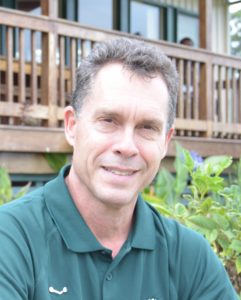 Ray has been a teacher at the Training Center since 2012 where he mostly concentrates on teaching linguistics related topics like Language Discovery (TTC) and Discover Your Language, where participants/students learn about grammatical structures in their languages that help them with the translation process. Before coming to Ukarumpa, Ray received a Masters degree in Linguistics and was involved in completing a New Testament translation project in Guyana, South America. Ray loves the people of PNG and desires to see more people grow in their experience with God’s Word in the languages that speak best to their hearts.
Ray has been a teacher at the Training Center since 2012 where he mostly concentrates on teaching linguistics related topics like Language Discovery (TTC) and Discover Your Language, where participants/students learn about grammatical structures in their languages that help them with the translation process. Before coming to Ukarumpa, Ray received a Masters degree in Linguistics and was involved in completing a New Testament translation project in Guyana, South America. Ray loves the people of PNG and desires to see more people grow in their experience with God’s Word in the languages that speak best to their hearts.
Vico Solano (Teacher)
Devin Schlote (Teacher)
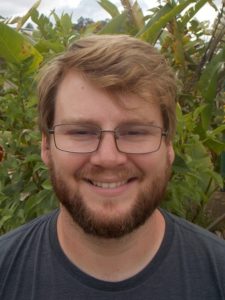 Devin moved to PNG from the United States in July, 2019 along with his wife, Charity, and daughter, Keseda. He has a B.A. in Biblical Studies, an M.A. in Biblical Languages, and a graduate certificate in Applied Linguistics. He loves seeing God’s Word come alive in the hearts and minds of students so that they may grow in their love and knowledge of Jesus and share it with others.
Devin moved to PNG from the United States in July, 2019 along with his wife, Charity, and daughter, Keseda. He has a B.A. in Biblical Studies, an M.A. in Biblical Languages, and a graduate certificate in Applied Linguistics. He loves seeing God’s Word come alive in the hearts and minds of students so that they may grow in their love and knowledge of Jesus and share it with others.

